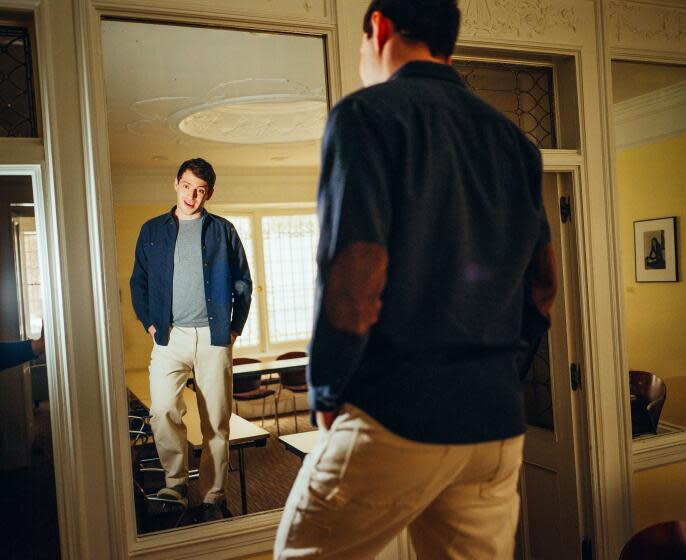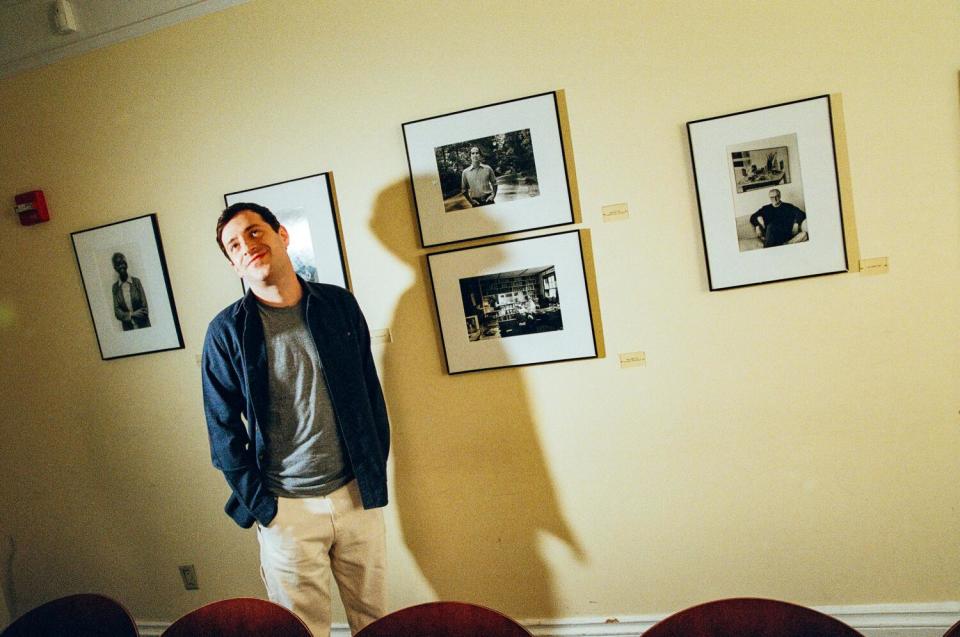Want to do a solo show? Grab a friend or two first, says Alex Edelman

I’m asked sometimes now how to craft a solo show.
Well, if you’re me, at least, here’s how you start. First, assemble all the stand-up material that you’ve mined and scrounged from comedy sets on stages in Brooklyn breweries or Midwestern cities or Scottsdale malls and put them into various notebooks, emails to yourself or backs of receipts. Then, go to London and sit down at a table with your friend, Adam Brace. Then take all that stuff and throw it like rice at a wedding, at Adam, who, fortunately, also happens to be your longtime director.
For me, the phrase “solo show” has always kind of been an oxymoron. I craft my solo shows by bouncing ideas off of other people. Especially Adam.
That’s how "Just for Us" began. Before it was a Broadway offering, a touring show that your friend’s aunt really liked or a streaming special, my solo show was a story I told a pal over three ciders to try to make him laugh. This is my process. I find the friend whom I most want to be seen as clever by, and I empty out my mental backpack onto the table in front of them.
Adam sat across that table, one drink ahead of me. He hem-hawed and "mmm"-ed and tsk-ed and scribbled in a Moleskine and, occasionally, gave me my favorite sound in the world, which was this big, booming, hurling laugh that meant there was something there. And I told Adam this story about something that had happened since I last saw him: I had gone to a meeting of white nationalists in Queens, N.Y., and sat there for a while before being found out. The story would be more interesting to Adam than to a stranger — he knew my neuroses, my desire to be liked, my Orthodox Judaism from working on two previous shows together, and from his interjections and provocations, narrative was starting to emerge. “That story,” he told me, “there’s something in there. It might be enough for a show.”
Read more: ‘I can’t do it anymore': Alex Edelman on ending 'Just for Us,' his hit show about antisemitism
Adam was right. Besides the fact that the meeting was a setting where so many parts of me could show up for comic examination, there was a tangentially geopolitical aspect to it. The question, which audiences found interesting, was the double bind of whiteness: In that room, I was allowed in because my skin color allowed me to pass for what the attendees found socially acceptable — but they considered me excluded because of my Judaism.
In the sandbox around that, I found jokes that were timely but also age-old. And not just limited to Jews. Audiences from all backgrounds found valence to a story that I found to be more about assimilation than antisemitism. And the conversations sparked by the show rebounded into it. An answer to a tough question on a sidewalk after Tuesday’s show might wind up in it on Thursday.
Later, I found help in a different conversation, over a different table, 5,000 miles from the one I ate at with Adam. I had gone to see Mike Birbiglia’s show "The New One," and afterward hauled him to Grand Central Market for some Thai food. After a few bites, Birbiglia said, “I hear you have a decent solo show.”
“Yeah, my last one.”
“What’s it about?”

I told him. He blinked and stopped eating for a second.
“That’s not your last show,” he told me, “that’s your next show.”
Birbiglia considered.
“Why don’t we put it up in New York for a night, and if it’s any good, maybe we’ll do something with it.”
Birbiglia’s guidance too was essential in kicking the show on. It helps that he’s probably the best solo show artist in the country, and had done this before with Jacqueline Novak’s “Get on Your Knees.” He encouraged an even stricter adherence to the main narrative, and Adam and I set about cutting 20 minutes of tangential jokes and adding 30 or so new minutes.
When the show opened in New York, it found a home with audiences off-Broadway. Fulsome word-of-mouth and additional notes from visiting comedy legends — Billy Crystal, Jerry Seinfeld, Steve Martin — helped haul it on Broadway, where it was filmed for HBO. And the conversations. They sustained the show and then me through some tough bits. A show-threatening omicron shutdown, illness and the loss of Adam, who passed away at the end of April 2023. I could not possibly miss him more. A final essential collaborator was found in the multihyphenate Alex Timbers, who, stepping in as a creative consultant and eventual director of the special, elevated it in a way that no one else could have for Broadway and capture.
When I watched the special for the first time as a finished piece, I saw behind the jokes the breadcrumbs of countless arguments, debates and the masters of the stage and eagle-eyed audience members alike who had helped me sand it into something.
As I said, people ask me all the time now how to make a solo show. It’s easy.
All you need is thousands of other people.
This story originally appeared in Los Angeles Times.
